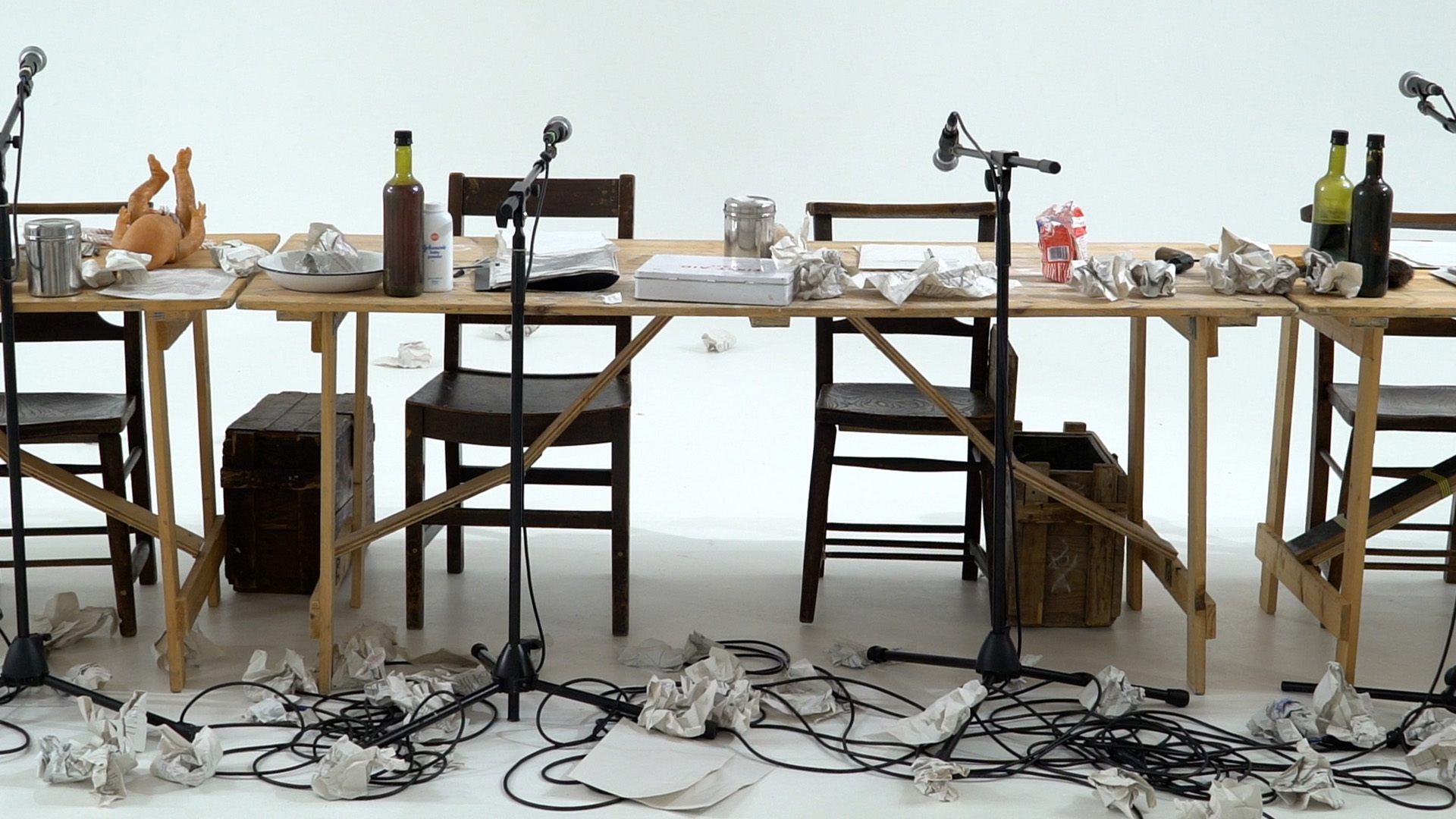About
Art Of Attachment Film Installation explores notions of home, family and belonging and considers the impact of trauma on women’s lives. The work makes explicit the devastating impact of physical, sexual and emotional abuse and explores the complex bond between substance misusing mothers and their children, celebrating the everyday hope, resilience and resolve of those overcoming childhood adversity, whose stories demand to be seen and heard.
Art Of Attachment Film Installation is staged across two large TV screens, with 5 smaller screens providing interviews with the professional and non-professional collaborators involved. resource materials and interviews. The work is watched seated around several large wooden trestle tables, with self-regulating craft activities taking place around the table during and after watching the work along with facilitated discussions.
VDT is currently screening Art of Attachment as a training and skills development tool for Social Work and Dance students at universities across the UK. See here
VDT’s facilitated screenings offer a creative health professional development opportunity for Further and Higher Education students to engage with creative practice as a tool for self-reflection, self-care and self-expression, both for the students themselves and the clients they work with.
What is a facilitated screening?
A Facilitated Screening of VDT’s Art of Attachment, a dance theatre production on film that shares the lived experience and stories of four women in recovery from substance misuse, followed by creative and reflective activities to explore how creative practice can unlock what cannot always easily be said, to improve health and wellbeing and positively impact on personal and professional practice.
Who is it for?
Social Work, Health, Social Care, Childhood and Youth Studies, Sociology, Education, Policing, Gender Studies students and trainees.
ART OF ATTACHMENT was originally commissioned by Oasis Project and funded by Wellcome Trust and Arts Council England Lottery Funding, supported by academic collaborator Dr Cath Lambert, Professor of Sociology in the Department of Sociology at the University of Warwick, funded by an ESRC Impact Acceleration Award, supported by the Centre for the Study of Women and Gender at the University of Warwick and by Arts Council England, through VDT’s regular National Portfolio Organisation funding.
Credits
Directed and Designed by
Charlotte Vincent
Artistic Director & Chief Executive (She/Her)

Charlotte formed Vincent Dance Theatre (VDT) in 1994 and has directed all the company’s collaborative work to date, on stage and on film. Vincent has also designed the work since 2005 and performed with the company until 2002. Vincent’s distinctive, contemporary choreography ‘stages ideas’ and embeds her own and her collaborators’ lived experience within the work, raising awareness of personal and political issues, breaking down the barriers between professional and non-professional performers and in VDT’s film installation and engagement spaces, between audience and participant.
Vincent is recognised as a sector leader in movement based socially engaged creative practice and creative health, particularly around her work with care-experienced young people and women at risk, championing gender equality and advocating for best practice to support parents and carers working in the performing arts. Her pioneering work on film ensired VDT were ‘covid ready and able to work through Covid and consequently allows Vincent’s work to be purposefully ‘applied’ in non-arts settings as well within conventional arts venues and settings.
Charlotte is an experienced speaker, lecturer and Mentor, working with early and mid-career artists to develop their creative practice and production work. Vincent has also worked as a director, dramaturg, and facilitator for other artists and companies, most notably Two Destination Language (Near Gone, winner Total Theatre Awards for Innovation and Experimentation 2014), Keira Martin (Here Comes Trouble Sadlers Wells Wild Card and Good Blood) and facilitating early R&D for Sue MacLaine’s Can I Start Again Please (2013).
In the past, Vincent has performed and collaborated with Professor Liz Aggiss as V&A Artefacts, curated an inaugural 4-week festival of experimental performance practice, Juncture at Yorkshire Dance in Leeds and co-hosted The Table, a forum to nurture dialogue across disciplines between established female artists with Dr Claire Macdonald. Charlotte sat on the Artists Advisory Group at Yorkshire Dance for several years and Steering Group for Dance UK’s National Choreographic Conference in 2013. Most recently she has been a driving force behind the development of the London Road Network in Brighton, a collaborative group of organisations and individuals working towards deeper interaction between arts orgs and grassroots organisations in one of Brighton’s more deprived areas.
Vincent is Safeguarding Lead for VDT, trained in Trauma Informed Practice, Mental Health First Aid, therapeutic parenting, and First Aid. She completed a Clore Leadership Short Course (2010), the Clore Programme for CEO/Artistic Directors (2011) and Clore Brave Conversations Programme (2013). Vincent is also trained in FA Football Coaching.
Vincent has written chapters and been written about in several Routledge Publications (resources) and PhD’s, and her work Art of Attachment lies at the heart of Dr Cath Lambert‘s imminent publication Troubling Adoption.
In 2023, Dr Vincent gained a PhD in Performing Arts from Canterbury Christ Church University, reflecting on VDT’s socially engaged practice, supervised by Professor Angela Pickard, Director of the Sidney de Haan Centre for Arts and Health.
Dr Charlotte Vincent lives in Brighton with her son, who loves mountain biking, fishing and gaming.
Film Maker
Bosie Vincent
Filmmaker & Photography

Bosie has been making films, documentaries and television programmes for over 20 years for the BBC, Channel 4, Sky Arts, PBS, Discovery and National Geographic. His work covers a diverse range of subjects including science, art/design, music as well as wildlife and adventure and it has taken him all over the world.
Working primarily as a self-shooting director Bosie has found himself in many extraordinary locations and situations. In the last couple of years he has camped in a cave in Borneo for four days in search of rare wildlife, filmed historian Michael Wood in China for BBC2’s The Story of China, followed young black Americans tracing their cultural roots on a religious pilgrimage to Nigeria and followed scientists working on an erupting volcano in Hawaii. He has also shot/directed programmes on architecture, fashion, the development of modern music and the stories of the world’s most notorious art heists.
Bosie has lived in Brighton for over 25 years. He once worked as the council’s ‘Video Worker’ making films with disadvantaged members of the community. He has made a short film about Brighton’s enduring mod scene and has showcased the work of local artists and photographers.
Soundtrack by
Jules Maxwell
Sound Design

Jules Maxwell has composed music for a wide variety of choreographers over the last 20 years, including Wayne McGregor, Dog Kennel Hill Project, Jasmin Vardimon, Jane Mason, Cathy Marston, Charlotte Darbyshire, Theo Clinkard, Filip Van Huffel, New Art Club, Laila Diallo, Charlotte Darbyshire, Hofesh Schecter and Jeanine Durning.
His background is in theatre and he regularly works at the National Theatre, The Young Vic and Shakespeare’s Globe. He also has a long standing relationship with artist Mark Storor with whom he has created many small and large scale promenade and circus pieces.
He composed the soundtrack to Tim Loane’s Oscar nominated short film Dance Lexie Dance (1996).
As a musician and song writer he has collaborated with Dead Can Dance, Foy Vance, Iain Archer and Duke Special.
He has recently co-written a collection of songs with Lisa Gerrard for a forthcoming album by Le Mystère des Voix Bulgares.
At the heart of his music and practice is a curiosity to find links across theatrical disciplines. He is as interested in drama as he is in sound. He cannot avoid hearing music in movement and light and language. He is drawn to the truth found in flaws and scars and people singing badly.
Since moving to France he has begun presenting monthly solo concerts of his own songs in the Café Gallery where he now lives.
Text by
Performed by
Antonia Grove
Participation Producer (She/Her)

Toni is a choreographer, writer, filmmaker, facilitator, lecturer and award-winning performer with over two decades experience leading Contemporary Dance and cross-artform collaborations. As Artistic Director of Probe (2004-2018), Toni reshaped the industry with ‘boundary-blurring’ (The Times) multidisciplinary & experimental productions, devising and performing work commissioned by internationally celebrated choreographers, directors, writers and cross artform collaborators.
As a performer she has worked in prestigious companies including Rambert Dance Company, Walker Dance Park Music, Company Wayne Mcgregor, The National Theatre, Bonachela Dance Company, Teac Damsa, The Cholmondeleys, Charles Linehan Company, Clod Ensemble and Vincent Dance Theatre (VDT). Performing physically & technically demanding contemporary dance repertoire (Merce Cunningham, Mats Ek, Christopher Bruce, Jiri Kylian, Richard Alston, Siobhan Davies, Ohad Naharin etc), alongside cross artform dance and theatre work (Lindsey Kemp, Lea Anderson, Michael Keegan-Dolan, Wendy Houstoun, Matthias Sperling, New Art Club etc).
Toni has worked with VDT since 2015, performing and collaborating on: Underworld, Virgin Territory, Art of Attachment and Hold Tight.
Toni was a winner of the first Place Prize by Rafael Bonachela, has been nominated 3 times for the Critics Circle National Dance Awards- best female dancer (modern)- and a Time Out Live Award. Awards for Probe include: Guglielmo Ebreo Award & London Theatre Award nomination. After six full-length touring productions with Probe she now leads projects under my own name.
Toni regularly leads, facilitates and designs trauma-attuned creative spaces for marginalised, mixed ability and multi-generational groups and individuals to find artistic expression through art/dance with safety and access at the core.
Toni recently obtained her MA: Creative Practice from Trinity Laban, researching relationships between female hormones and creativity. She has 3 children and is an activist for mothers working in the Arts.
Photo: Jo Thorne
Robert Clark
Artistic Associate

Robert Clark is a contemporary dance performer, choreographer and teacher working across Europe and the USA.
As a freelance performer Robert has worked with VDT since 2011 on a range of projects. Other employments include work with Charles Linehan, Fevered Sleep, Sasha Waltz and Guests, Cie Felix Ruckert, Cie Soit/Hans van Der Broek, Le Grand Jeu/Louis Zeigler, Lisa Torun Dance Company, Barebones (Rui Horta and Garry Stewart/Australian Dance Theatre), Ben Wrights Bgroup, Alletta Collins and Troika Ranch amongst others. In Loco Parentis is his 7th work with Vincent Dance Theatre.
Robert’s choreographic work has been recognised through a number of awards and prizes including the Simone Michelle Choreography Award and selection for the “Escalator Dance” programme, becoming a supported artist in the Eastern region of England. Robert has been; a Work place (associate) artist with The Place, London; a Resident Artist with Greenwich Dance, London; and an associate with Dance4 in Nottingham, England.
Robert regularly undertakes commission work. Recent commissions include work for Mapdance (University of Chichester), Wellcome Collection, Academy of Dramatic Art Zagreb and Koreokroj (Croatia).
Robert initially trained at the Laban Centre London BA (hons), before going on to complete his training at London Contemporary Dance School with EDge.
Photos
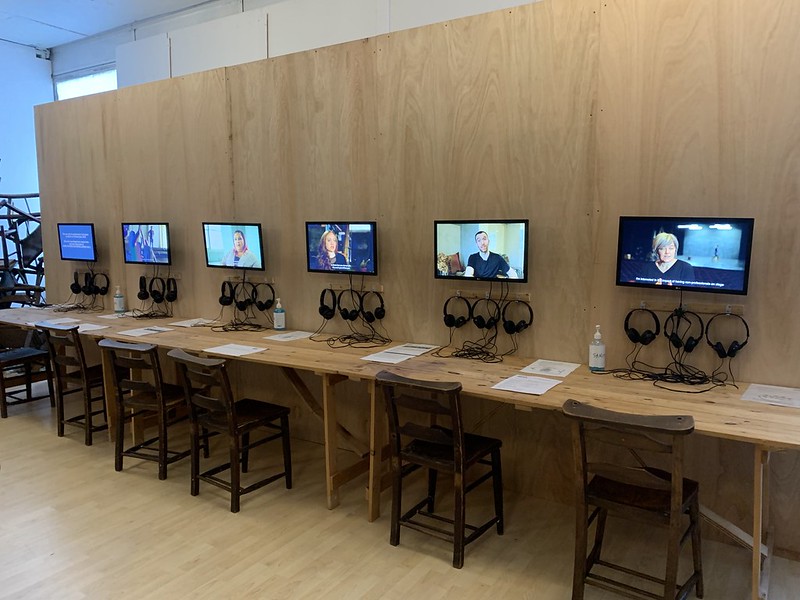
A wooden table with six screens displays different videos. Headphones are beneath each screen. Simple chairs are placed in a calm, well-lit room.
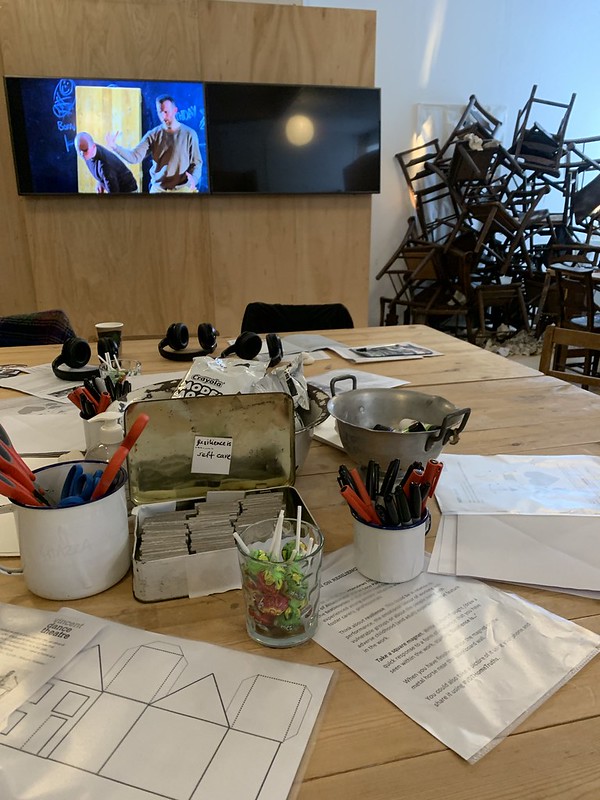
Craft table with scattered papers, markers, and a display screen in the background. Stacked chairs create a cluttered, busy atmosphere.
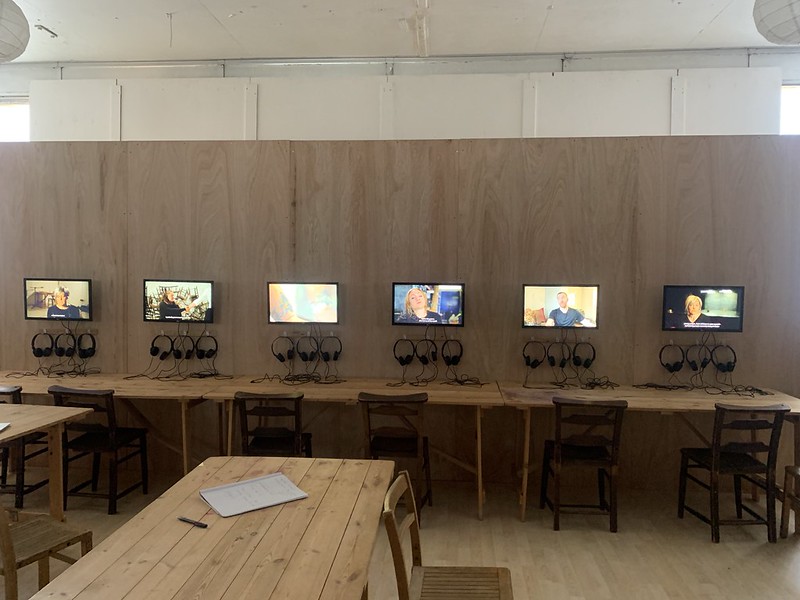
Room with six monitors on a wooden wall, each with headphones, displaying different videos. Wooden tables and chairs create a relaxed, educational ambiance.
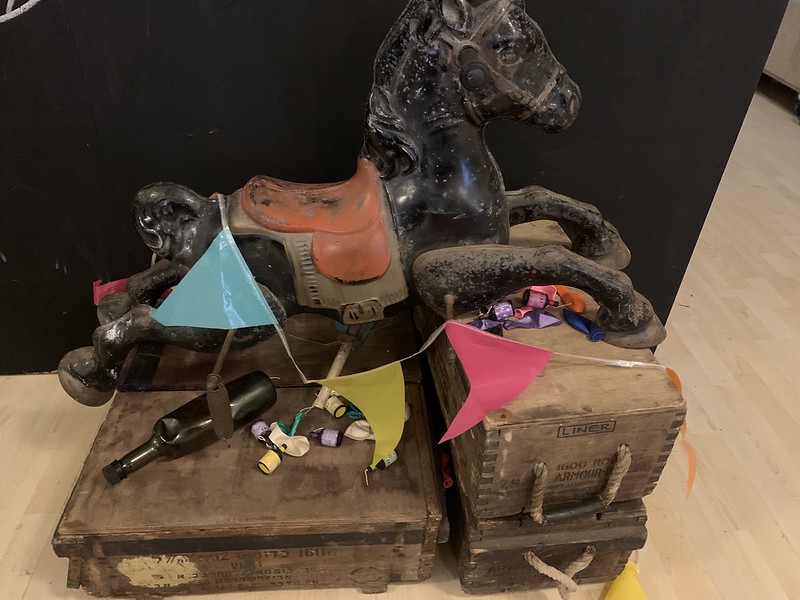
An old carousel horse with a worn saddle sits atop wooden crates. Colourful party ribbons and a glass bottle create a nostalgic, festive atmosphere.
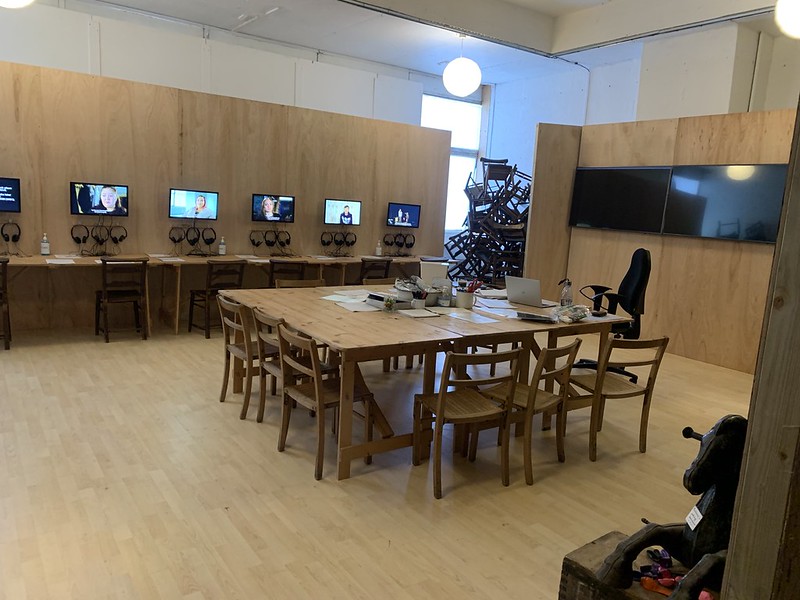
A room with wooden walls and floor features a long wooden table with chairs. Six screens and headphones line one wall, suggesting a multimedia setup.
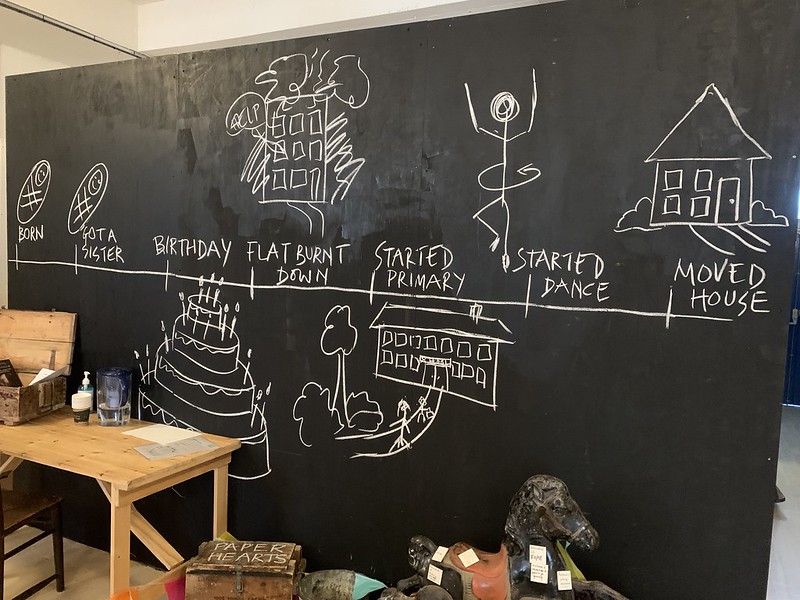
A chalkboard displays a timeline with hand-drawn illustrations for life events: birth, getting a sister, birthday, flat fire, starting school and dance, and moving house.
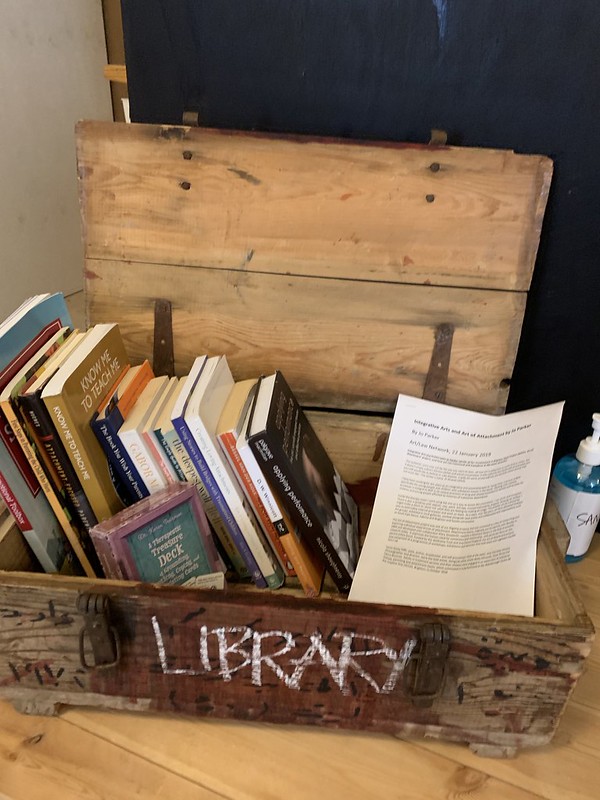
Wooden trunk labelled "Library" containing various books and a printed paper. The scene is cosy and rustic, with a bottle of hand sanitizer nearby.
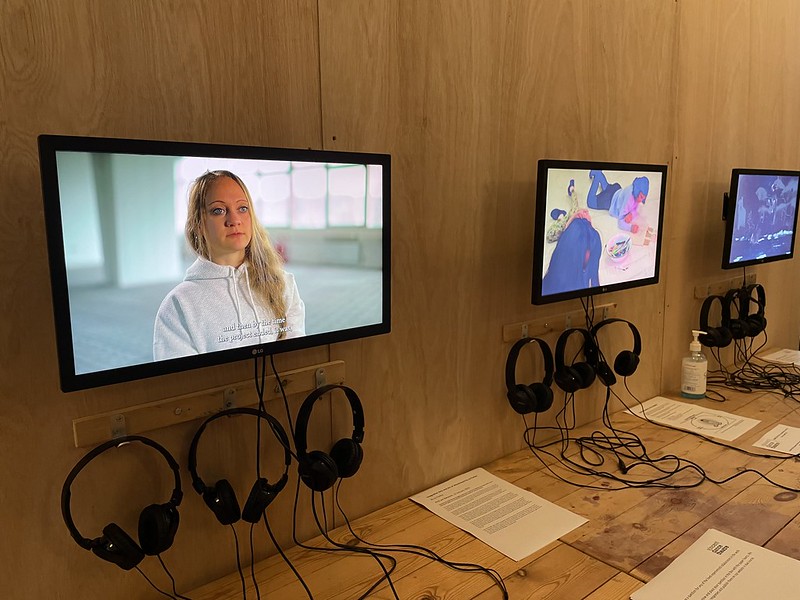
Three monitors are mounted on a wooden wall, each displaying different videos. Below them, headphones and informational papers are neatly arranged.
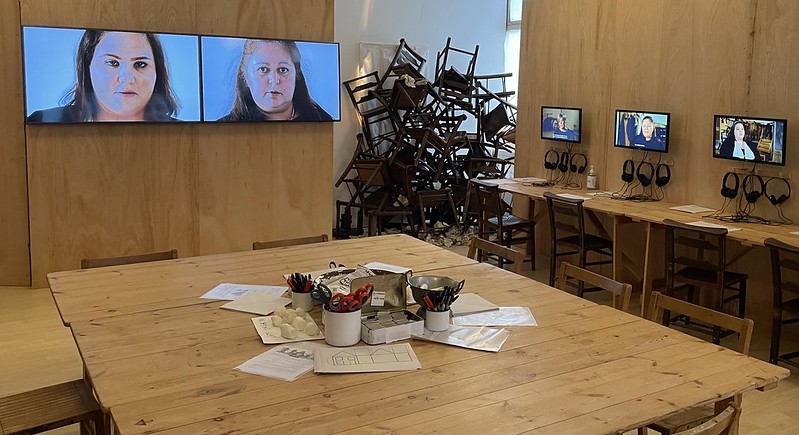
Art installation with a large wooden table and art supplies. Multiple screens display portraits and videos. A pile of chairs forms a sculpture, creating an intriguing, thoughtful atmosphere.
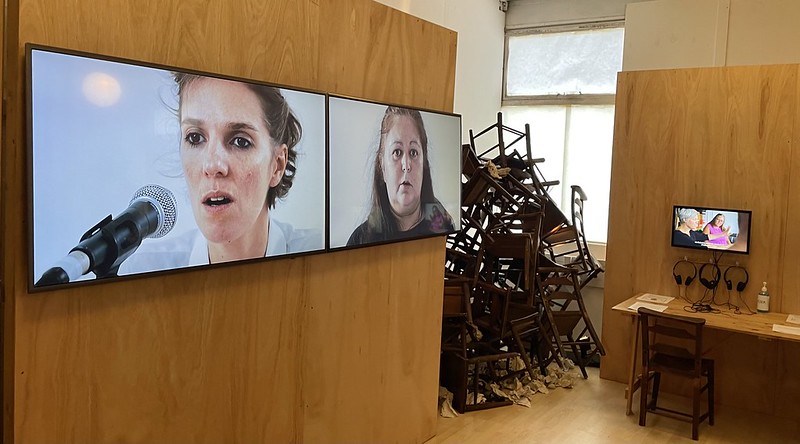
Two large screens display close-up portraits of serious-faced women speaking. A pile of wooden chairs and a desk with headphones sits nearby, creating an intense and contemplative atmosphere.
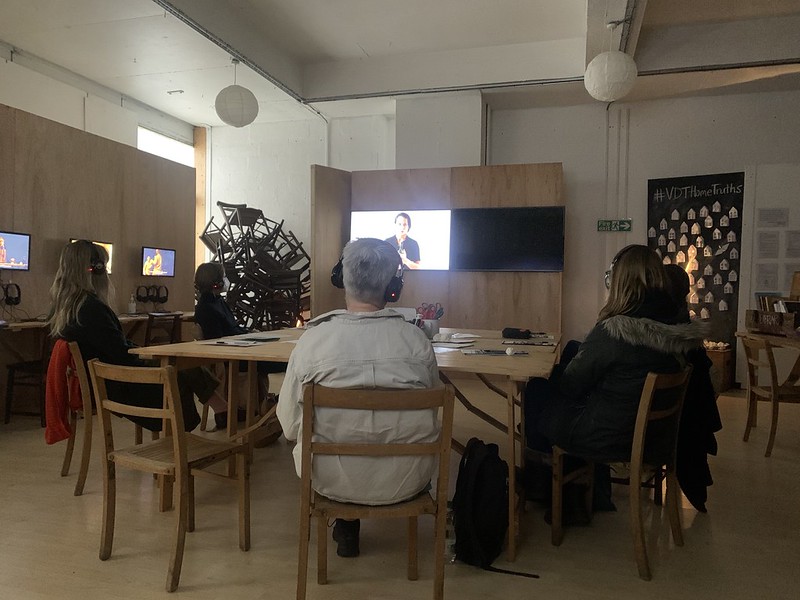
A group of people wearing headphones are seated around a table in a dimly lit room, facing a screen displaying a speaker. The atmosphere is focused and attentive.
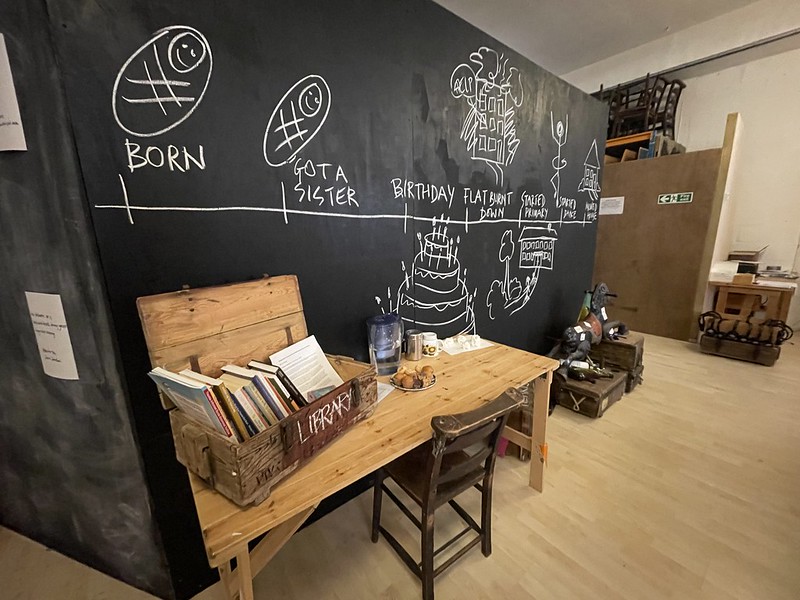
A cosy room with a large blackboard displaying whimsical chalk drawings and a life timeline. A wooden table holds books and a basket labelled "Library."
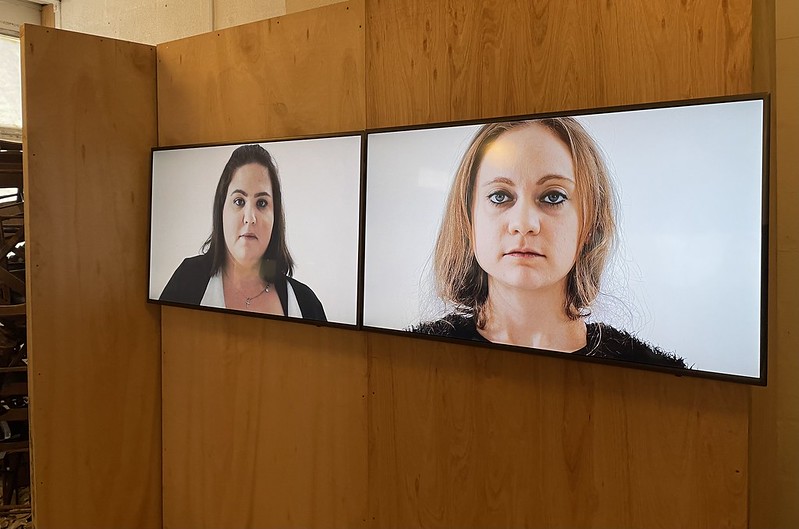
Two side-by-side screens display portraits of women with neutral expressions against a white background, mounted on a wooden wall.
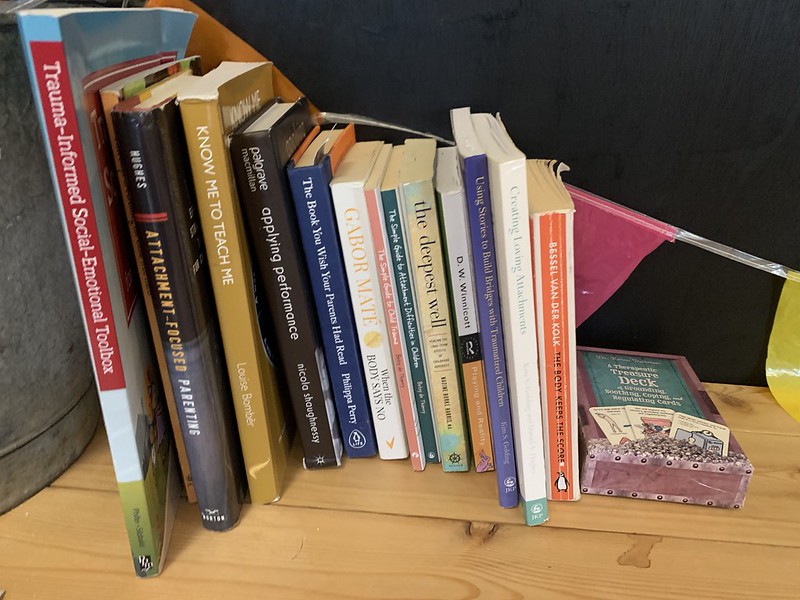
Books on trauma and self-help stand upright on a wooden shelf, with colourful bunting in the background, conveying a thoughtful and supportive tone.
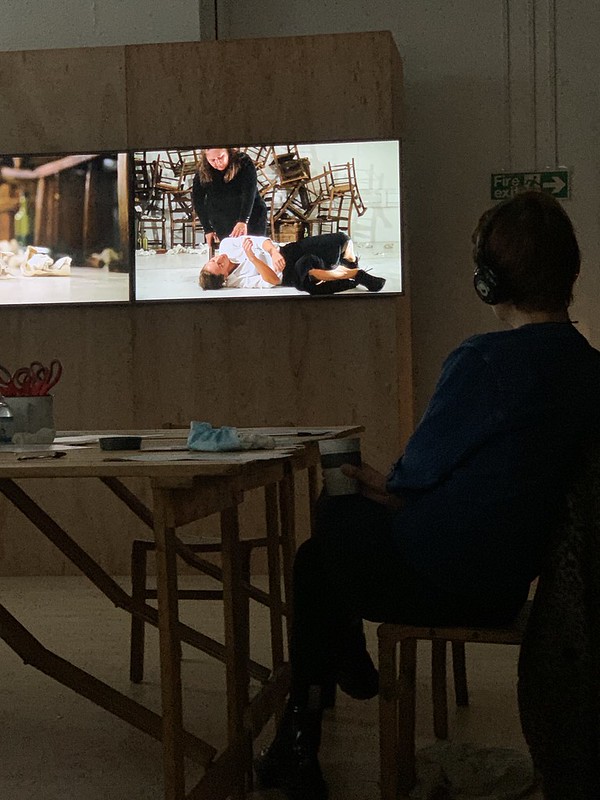
A person wearing headphones sits at a table viewing a dual-screen display with images of a woman working with wood, creating an introspective atmosphere.
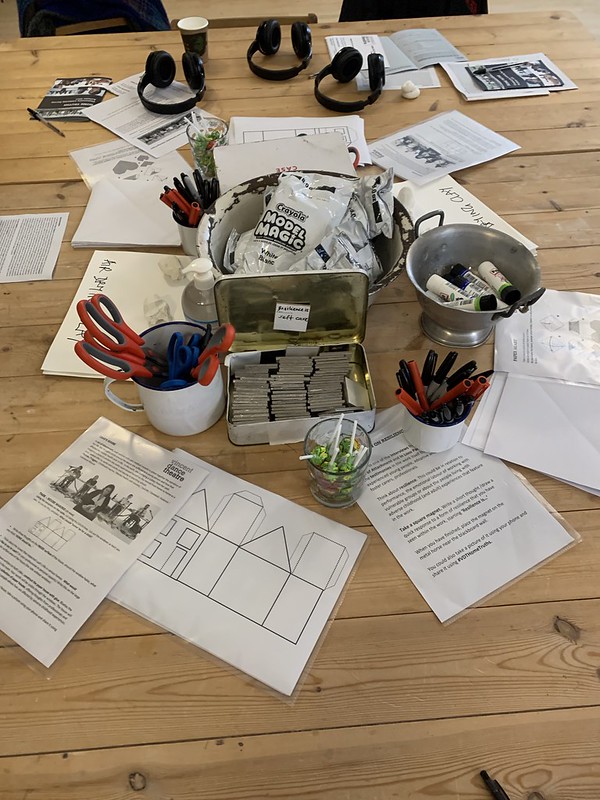
A wooden table with art and craft supplies, including scissors, markers, paper, headphones, and small containers. The setup suggests a creative workshop.
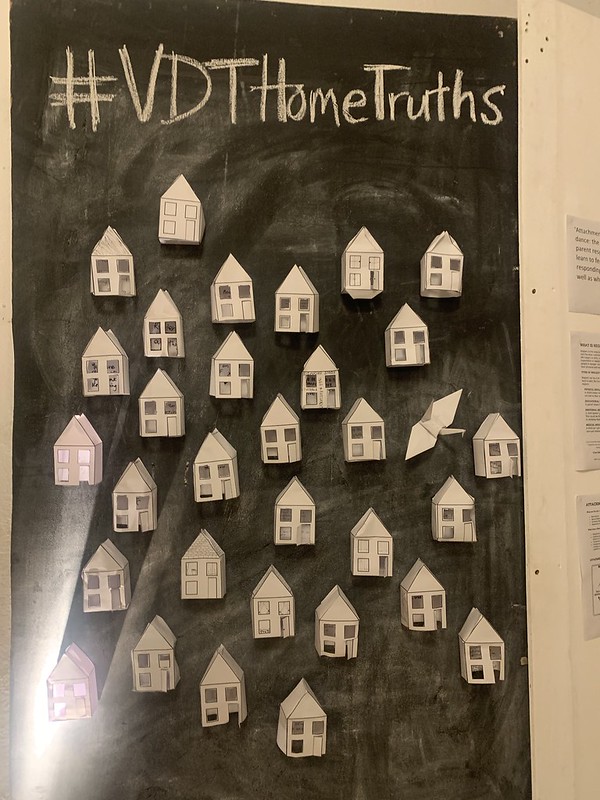
A blackboard displays "#VDTHomeTruths" with 30 small paper cut-out houses arranged neatly. The tone is reflective, highlighting home concepts and truths.
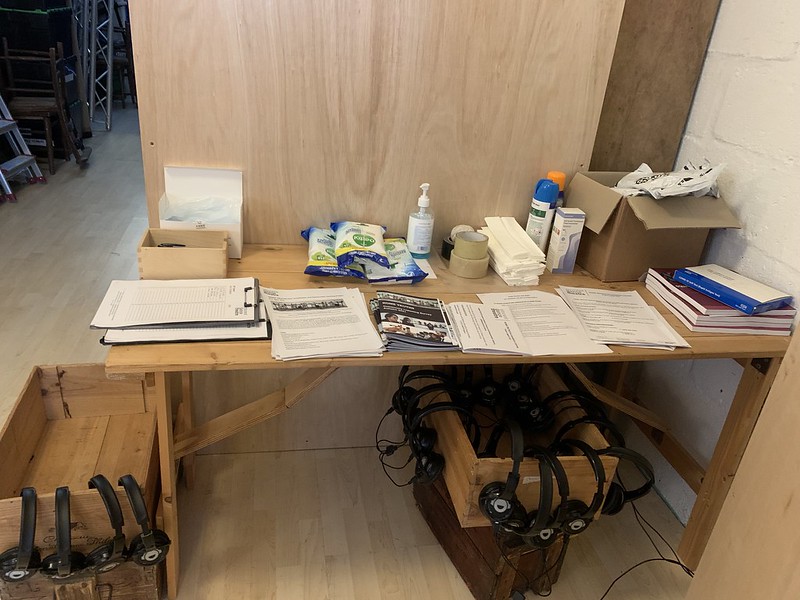
A wooden table against a plywood wall holds papers, folders, hand sanitizer, wipes, and tape. Below, boxes contain clamps and coiled cords, suggesting a workspace.
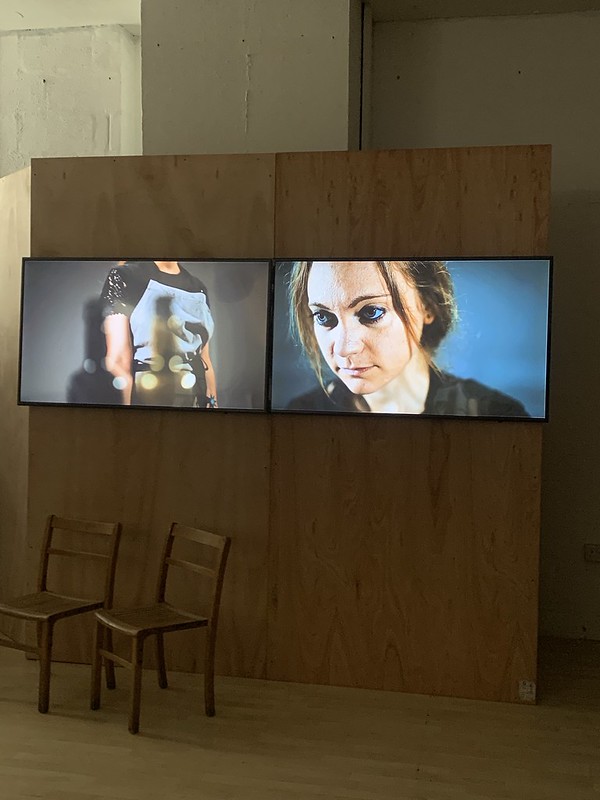
Two wooden chairs are placed in front of a wall with two large screens. One shows a person’s blurred figure, and the other shows a woman looking thoughtful.
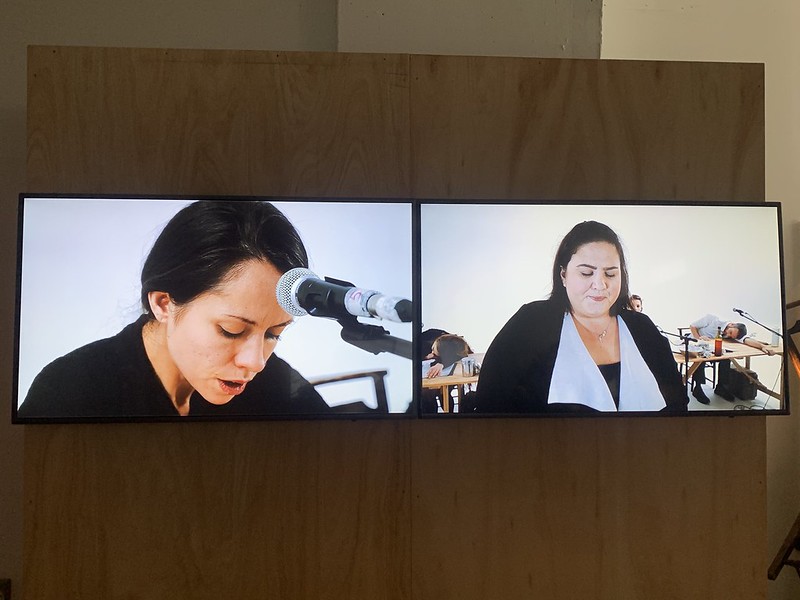
Split screens show two women reading. The left screen captures an engaged speaker at a microphone. The right screen shows a reflective woman with people sleeping in the background, evoking a contemplative mood.
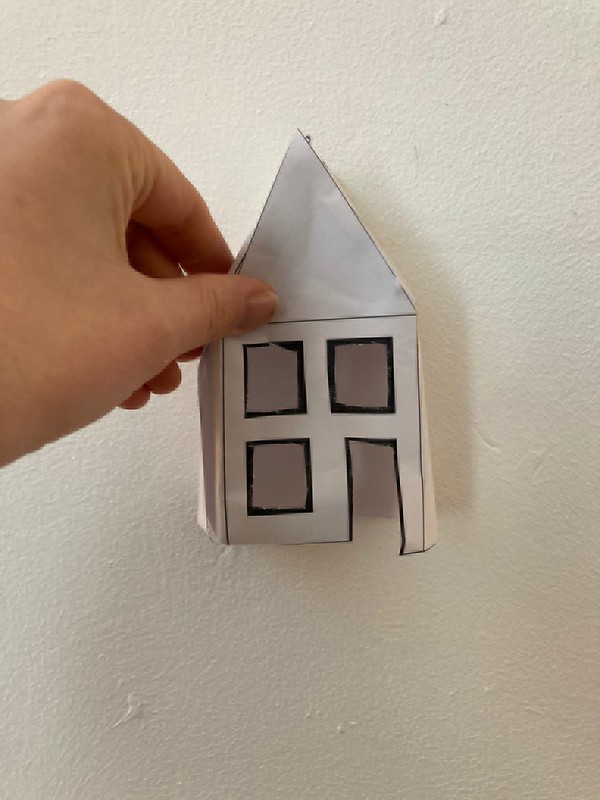
A hand holds a small paper craft shaped like a house with a triangular roof and windows, against a plain wall, evoking a playful, creative tone.
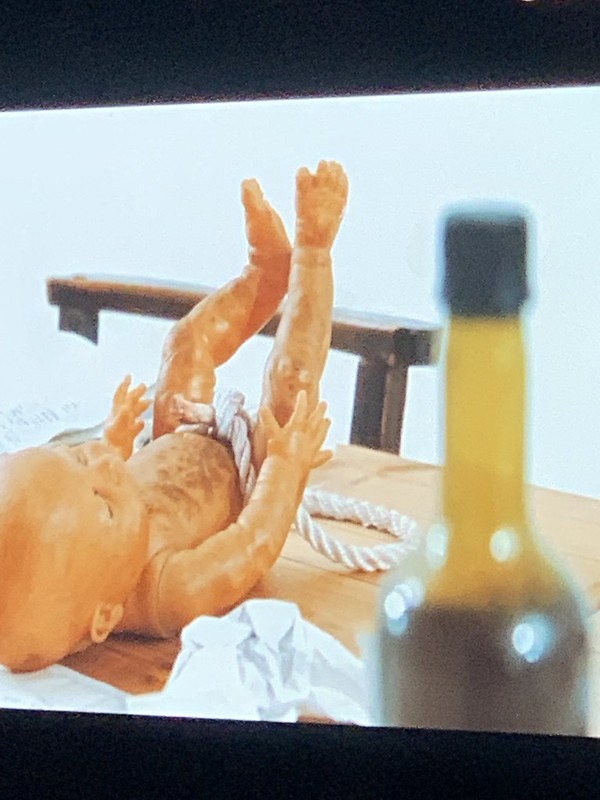
A plastic baby doll with marked skin in a diaper lies on a wooden table next to a bottle and rope. The scene seems unsettling and tense.
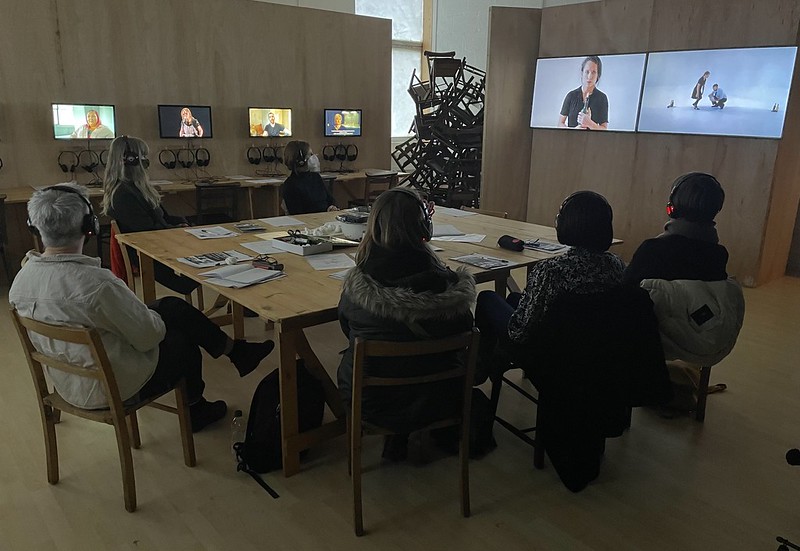
Seven people wearing headphones sit at a wooden table, watching multiple screens displaying various people. The atmosphere is focused and engaged.
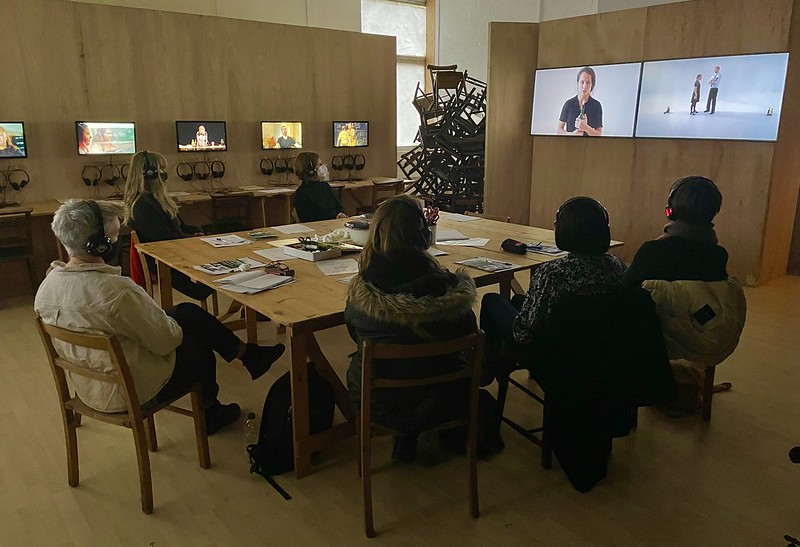
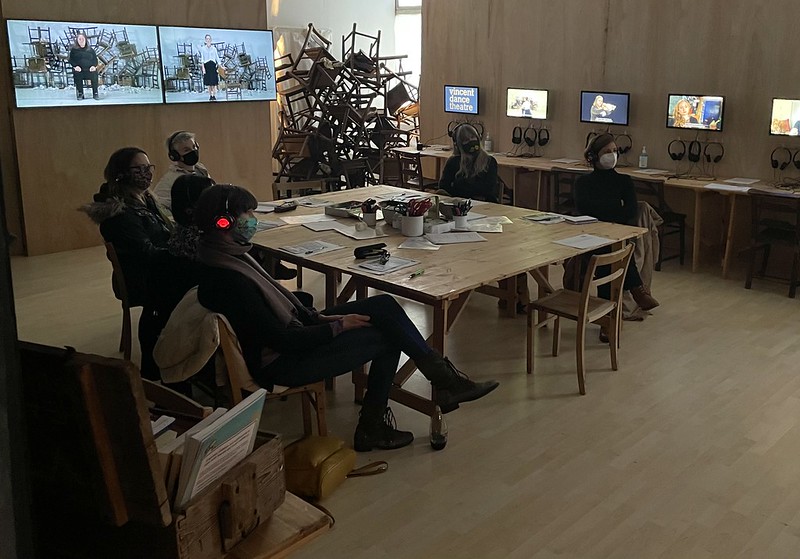
People wearing headphones and masks sit around a wooden table in a dimly lit room with TV screens on the walls and a stack of chairs in the corner.
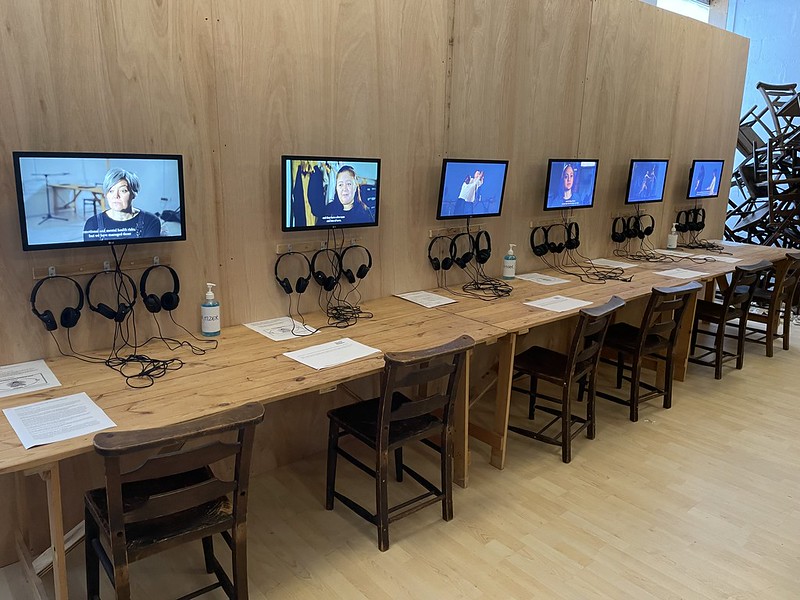
Wooden desks with computers and headphones line a room. Each screen displays a person speaking. Papers and hand sanitizer are placed on the desks. Calm atmosphere.
Press
“‘Agonisingly visceral, and often beyond words… a piece about love as an enduring source of hope.” ”
The Psychologist
““There is no sentimentality… it does not ask us to judge or to pity – but allows us to witness the exhausting labours involved in experiencing, acting out and recovering from trauma.” ”
Rachel Thomson, Professor of Childhood and Youth Studies, University of Sussex
